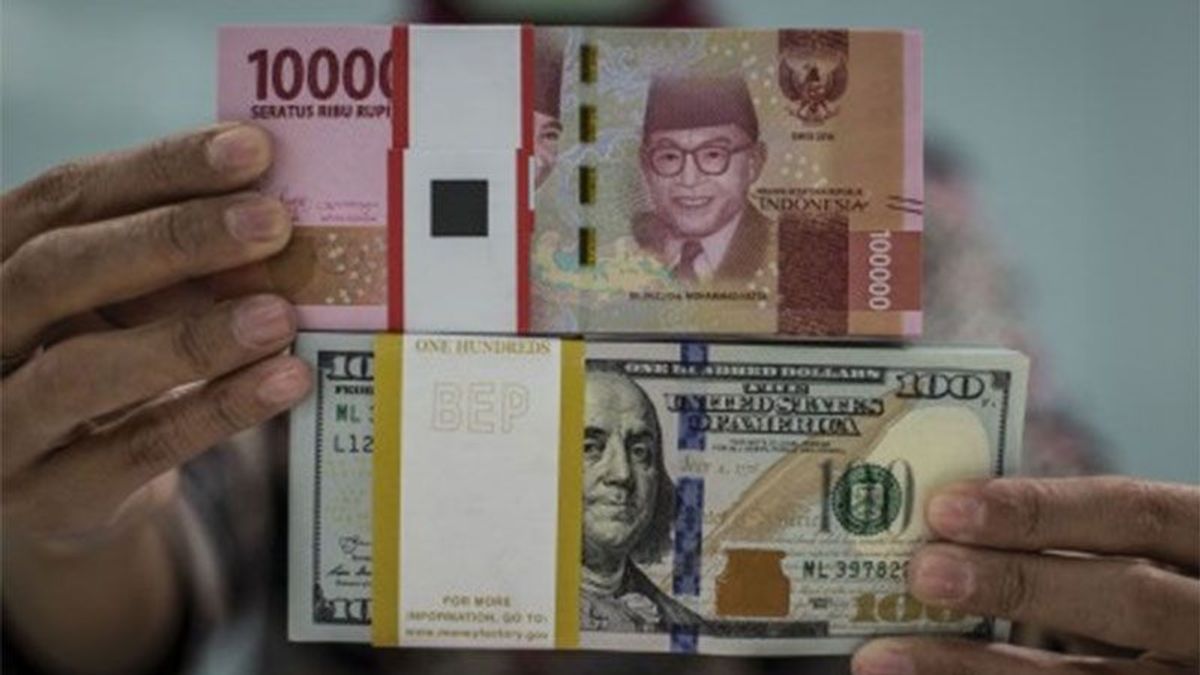JAKARTA - Segara Institute Executive Director Piter Abdullah Redjalam said the weakening of the rupiah exchange rate against the United States (US) dollar does not need to be addressed with excessive fear.
According to him, the condition of the national economy is still relatively safe, even though the rupiah is depreciated against the US dollar which continues to strengthen.
"In my opinion, it is still relatively safe, even though we are experiencing rupiah pressure. It has not become something that endangers our economy," Piter said, in Jakarta, Tuesday, October 25.
Piter said the weakening of the exchange rate did not only occur in Indonesian currencies, but many countries experienced it. In fact, the UK and Australia also experienced an extraordinary weakening. "Even if we look at their deeper weakening, for example we look at the rupiah against the AUD, we are strengthening it," he said. Furthermore, Piter emphasized that the weakening of the rupiah must be seen clearly. Because, there are advantages and disadvantages in the decrease in the exchange rate. Economic actors who rely on the export sector will definitely benefit from strengthening the strengthening of the US dollar. "There are parties who actually benefit from the increase in the price or the weakening of the rupiah. For exporters, the weakening of the rupiah will be profitable. If importers will definitely feel heavy," he said. Piter said that currently Indonesia's trade balance is actually more exported. This means that many parties feel benefited by strengthening the US dollar. "Now what is our position? More imports or exports? If we look at trade balances, we are more exports than imports," he said. However, Piter said, there are also parties affected by the weakening, namely small communities.
This is due to the increase in the price of imported goods so that it can trigger an increase in inflation.
"This means that the lower community groups are affected. If inflation is definitely affected, it is the poor," he concluded. BI Must be More Aggressive
Meanwhile, the Lukman Leong Money Market Observer assessed that Bank Indonesia (BI) was less aggressive in raising the benchmark interest rate.
Lukaman said, the policy of raising interest rates twice was 50 basis points, late from market sentiment.
"BI is trying to be aggressive and according to them it is already aggressive, twice the increase is 50 bps, it is aggressive, but it is late. It's like when the market hopes 50 bps, BI said aggressively as the preventive should be 75 bps. Far from being compared to the Fed, which is very aggressive," said Lukman.
Lukman said that currently the BI benchmark interest rate is at 4.75 percent, this reflects that BI is not sure about the inflation rate. "BI itself is less confident that inflation in the future can reach how much. It is still a question mark, it is estimated that October alone is already above 6, at least 8 percent will be achieved by the end of the year," said Lukman.
Lukman said that the 8 percent inflation rate must be watched out for because of the effect of spiral inflation.
Meanwhile, uninteresting interest rates make investors leave Indonesia, both from bonds and stocks.
This condition prompted investors to shift their assets to dollars, so that the rupiah weakened.
He estimates that the rupiah can reach IDR 16,000 per dollar.
"The important thing is that investor sentiment is negative, if it is negative, like now investors have released everything, because it is not attractive with the current interest rates," he said.
Not only that, the pressure on currency and inflation which is getting higher, the government must be aware of.
According to Lukman, one way that can be done is to ensure the availability of food and control prices by market operations.
As previously reported, the government is trying to maintain inflation with coordination and synergy between the inflation control team (TPID) and the Central Inflation Control Team (TPIP). Then market operations were also encouraged.
"So that all regions are advised to improve the implementation of market operations as well as the Availability of Supply and Price Stabilization (KPSH) program in coordination with the local Bulog," said Coordinating Minister for the Economy Airlangga Hartarto.
The English, Chinese, Japanese, Arabic, and French versions are automatically generated by the AI. So there may still be inaccuracies in translating, please always see Indonesian as our main language. (system supported by DigitalSiber.id)












